
July 8
1838 Birth: Count Ferdinand von Zeppelin, in Konstanz, Prussia: inventor of the rigid airship, or dirigible balloon; educated at the Ludwigsburg Military Academy and the University of Tubingen.
He entered the Prussian army in 1858. Zeppelin went to the United States in 1863 to work as a military observer for the Union army in the American Civil War and later explored the headwaters of the Mississippi River, making his first balloon flight while he was in Minnesota. He served in the Franco-Prussian War of 1870-71, and retired in 1891 with the rank of brigadier general. Zeppelin spent nearly a decade developing the dirigible. The first of many rigid dirigibles, called zeppelins in his honor, was completed in 1900. He made the first directed flight on July 2, 1900. In 1910, a zeppelin provided the first commercial air service for passengers. By his death in 1917, he had built a zeppelin fleet, some of which were used to bomb London during World War I. However, they were too slow and explosive a target in wartime and too fragile to withstand bad weather. They were found to be vulnerable to antiaircraft fire, and about 40 were shot down over London.
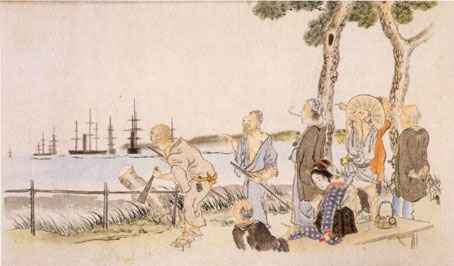
1853 Japan: Just in the manner Ranald MacDonald had recommended (See: July 1, 1848), US Navy Commodore Matthew Perry steams into Tokyo Bay with a "show of force": four warships, the Saratoga, Plymouth, Mississippi (above), and Susquehanna (known in Japan as the Black Ships or Kurofune). He demands that Japan open trade with the West. Representatives of the Tokugawa Shogunate tell him to proceed to Nagasaki, the only Japanese port open to foreigners at that time. Perry refuses to leave, demands to be allowed to present a letter from US President Millard Fillmore, and threatens force if his demand is denied. (Perry)
[See: Countdown to Infamy: Timeline to Pearl Harbor.]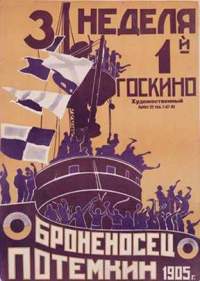
1905 Battleship Potemkin: The mutinous crew surrender to Rumanian authorities. The Romanian government then returned the battleship to the Russian navy. In October of 1905 it was renamed as Panteleimon. In April of 1917 the ship was renamed to Potemkin-Tavricheski; once again, however, in May they changed it to Borets za svobodu (Freedom Fighter). In 1918 it had been captured by the Germans, then recaptured by the White movement. In April of 1919, the interventionists blew it up in Sevastopol so it wouldn't fall into Bolshevik hands. After the Russian Civil War, the wreck of the Potemkin was raised from the bottom of the sea and dismantled because of irreparable damage.
1915 World War I: List Regiment: Gefreiter Adolf Hitler's 16 Reserve Infantry Regiment continues to occupy a position at Fromelles, on a level field with water channels, willow trees and willow stalks. In the distance towards the enemy lines lies an insignificant wood with barbed wire entanglements. Under the direction of their defense-minded commander, Lieutenant General Gustav Scanzoni von Lichtenfels, the regiment works ceaselessly day and night to further fortify their position at Fromelles while fighting off repeated assaults by the enemy. [For further details, Click here.]
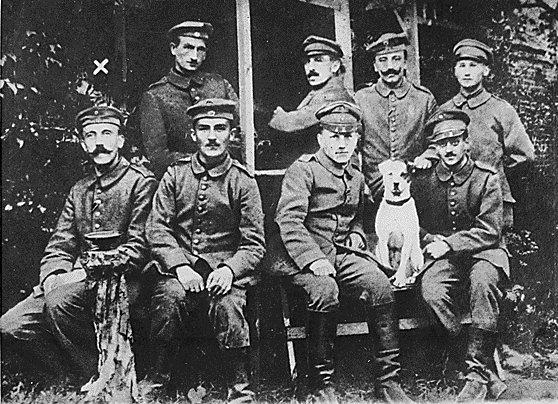
1916 World War I: List Regiment: Gefreiter Adolf Hitler endures trench warfare in Flanders (Artois) with 3 Company, 16 Reserve Infantry Regiment. [For further details, Click here.]
1917 World War I: List Regiment: Gefreiter Adolf Hitler's 16th RIR remain deployed for Phase 1 operations in Flanders, Belgium. [For further details, Click here.]

1919 Versailles: President Woodrow Wilson receives a tumultuous welcome in New York City after his return from the Versailles Peace Conference in France. Witnessing the welcome he receives, one could be forgiven for assuming that he'd actually accomplished something.
1932 Great Depression: The Dow Jones Industrial Average reaches its lowest level, bottoming out at 41.22.
1933 Church and Reich: Concordat: In the late hours of the evening, Ambassador Bergen informs the Foreign Ministry by telegram, "Concordat was initialed this evening at 6 o'clock by the Vice Chancellor (Papen) and the Cardinal Secretary of State."
Due to the special situation existing in Germany, and in view of the safeguards created by the clauses of this concordat of legislation preserving the rights and privileges of the Catholic Church in the Reich and its states (Laender), the Holy See will enact regulations to exclude the clergy and members of religious orders from membership in political parties and from working.
1934 Amsterdam: Sixty people are killed during an anti-Communist uprising.
1936 Danzig: The Polish government declares that the German-sponsored movement for Danzig independence is a belligerent act (causa belli) that could lead to war:
While he (Hitler) was focusing on taking Czechoslovakia, he was also pressuring Poland to give him the former German city of Danzig located on the Baltic Sea. And he wanted the Poles to permit construction of a new super highway and railroad stretching from Germany through Polish territory into East Prussia. The territory in question was known as the Polish Corridor, a narrow strip of land which gave Poland access to the sea and cut off East Prussia from the rest of Germany. Poland had been granted this sea corridor after World War I by the Treaty of Versailles, which also designated Danzig as a Free City operating under the supervision of the League of Nations.
1936 Arab Revolt in Palestine: Arabs send a memorandum to the British government demanding an end to Jewish immigration to Palestine:
The revolt in Palestine (1936 - 1939) was in many ways the decisive episode in the efforts of the Palestinian Arabs to resist the British mandate's support for a Jewish national home in Palestine. Although it helped force a British policy reassessment, which led to the 1939 white paper curtailing Jewish immigration to Palestine, ultimately the revolt must be judged a failure. At its conclusion in 1939, the Palestinian Arabs were exhausted by more than three years of British repression. Perhaps 5,000 had been killed and 15,000 to 20,000 wounded; 5,600 of their leaders and fighters were in British detention; and most of the rest were scattered outside the country or dead. Such losses, in a population of about 1 million Palestinian Arabs in 1939, meant that more than 10 percent of the adult males were killed, wounded, or detained by the end of the revolt.
1938 Holocaust: Alfred Rosenberg proposes a plan for establishing a reservation for 15 million Jews on the island of Madagascar, although such an idea has been suggested by others before him.
1939 Holocaust: Italy: companies dealing with their government are prohibited from employing Jews. (THP)
1940 World War II: Various: Poland: The German Fuehrer accepts Hans Frank's proposal that the General Government formally become part of the German Reich. (THP)
General de Gaulle criticizes the numerous British attacks on French ships during the past week:
Whereas as President Franklin D. Roosevelt in the USA recognized Vichy France, Winston Churchill refused and backed de Gaulle as leader of the "Free French". Henri-Philippe Petain responded by denouncing de Gaulle. On 4th July, 1940, a court-martial in Toulouse sentenced him in absentia to four years in prison. At a second court-martial on 2nd August, 1940, sentenced him to death.
1941 World War II: Various: German general's diary reveals Hitler's plans for Russia:
[Upon] the German army's invasion of Pskov, 180 miles from Leningrad, Russia, the chief of the German army general staff, General Franz Halder, records in his diary Hitler's plans for Moscow and Leningrad: "To dispose fully of their population, which otherwise we shall have to feed during the winter."
On June 22, the Germans had launched a massive invasion of the Soviet Union, with over 3 million men. Enormous successes were enjoyed, thanks in large part to a disorganized and unsuspecting Russian army. By July 8, more than 280,000 Soviet prisoners had been taken and almost 2,600 tanks destroyed. The Axis power was already a couple of hundred miles inside Soviet territory. Stalin was in a panic, even executing generals who had failed to stave off the invaders.
Franz Halder, as chief of staff, had been keeping a diary of the day-to-day decision-making process. As Hitler became emboldened by his successes in Russia, Halder recorded that the "Fuhrer is firmly determined to level Moscow and Leningrad to the ground." Halder also records Hitler's underestimation of the Russian army's numbers and the bitter infighting between factions within the military about strategy. Halder, among others, wanted to make straight for the capital, Moscow; Hitler wanted to meet up with Field Marshal Wilhelm Leeb's army group, which was making its way toward Leningrad. The advantage Hitler had against the Soviets would not last. Winter was approaching and so was the advantage such conditions would give the Russians.
War in the Air: Twenty B-17s fly on their first mission with the Royal Air Force over Wilhelmshaven, Germany:
Meanwhile at Brest, 79 Wellingtons, also operating without fighter escort, as well as 18 Hampdens and 3 Fortresses with an escort attacked the port and 6 hits were claimed on the Gneisenau. 10 Wellingtons and 2 Hampdens were lost to enemy fighters which had been drawn up by the escorted bombers. This was also the first operational use of the new American-built Fortress.
1942 World War II: Malta: Axis bombers carry out raids on harbor facilities at Malta, in the Mediterranean:
As historian Corelli Barnett has argued, the island had become the Verdun of World War Two, drawing Allied forces into a debilitating battle of attrition. Having been awarded the George Cross as a propaganda gesture, the island of Malta could not be allowed to fall as Singapore had done. Indeed the North African campaign was being fought in 1942 as much to sustain Malta as vice versa.
Yet in the late summer of that year Malta probably did play a role of some significance. As Stephen Bungay has shown, its renewed air and submarine striking forces prevented Rommel from fully exploiting the sea port of Tobruk, thus neutralising it as a supply point for his troops at Alamein.
In this way, therefore, Malta eventually vindicated, at least to some extent, the effort put into preserving it as a base across Axis communications. And after the Allied victories in North Africa, late in 1942, to which the island had finally contributed, the long siege of Malta was raised at last.
1943 World War II: Various: The battle of Kursk is about to reach its climax, with the exhausted German forces unable to make any further gains while losing vast numbers of men, tanks and planes:
German prisoners captured by Russian shock troops before the battle actually started, told the Russians that the attack was to be on July 5th. To pre-empt the attack, the Russians launched a massive artillery bombardment at 02.00 on July 5th. This had an impact on the morale of the Germans as it was clear that their plan had been compromised. After the bombardment had finished, it took nearly two hours for the Germans to reorganise themselves.
Germany started her attack at 04.30 with an artillery barrage. A tank and infantry attack started at 05.30 once air cover had arrived. The main thrust contained 500 tanks; heavy tanks at the front, supported by medium ones behind with infantry behind these. The Germans tried to break through on four occasions. They gained 6 miles of land in the first 24 hours of fighting but at a cost. 25,000 men had been killed or wounded, 200 tanks and self-propelled guns had been lost and 200 aircraft. A similar pattern occurred over the next few days. Ferocious German attacks were met with ferocious Russian defence.
Death: Jean Moulin: French Resistance leader: Moulin was arrested June 21, 1943 in Caluire-et-Cuire (Rhone), in the home of Doctor Frederic Dugoujon, where a meeting with most of the resistance leaders was taking place. Interrogated in Lyon by Klaus Barbie, head of the Gestapo there, and later in Paris, he never revealed anything to his captors. He died near Metz, in the Paris-Berlin train which was taking him to a concentration camp.
War with Japan: American bombers make a strike on Japanese-held Wake Island for the first time. On July 8, 1943, B-24 Liberators in transit from Midway Island struck the Japanese garrison on Wake Island. George H. W. Bush also conducted his first mission as an aviator over Wake Island. After this, Wake was occasionally raided but never attacked en masse.
1944 World War II: France: The British Second Army (Dempsey) begins a major attack (Operation Epsom) to capture Caen:
Controversy lingers around the objectives for Operation Epsom, the British drive southward to the west of Caen. As most observers saw it, the operation misfired badly: 8th Corps' advance was brought to a standstill by bad weather and lack of air support, and finally ground to a halt with heavy casualties.
By contrast, Montgomery maintained that the ground gained was secondary. The objective was not to bypass Caen but to provide a 'hinge' on which the broader Allied advance could turn. Operation Epsom had succeeded to the extent that it had pinned down several German divisions, facilitating an American breakout to the west of the bridgehead. The validity and appropriateness of this strategy remain subject to debate.
Russian front: Soviet 1st Belorussian Front recaptures Baranovichi NW of Brest-Litovsk.
Holocaust: Hungary: The government, reading the writing clearly on the wall, orders an immediate halt to the deportation of Hungarian Jews. The Germans give way, and 300,000 Jews, most of them in Budapest awaiting deportation, are saved. 437,000 Hungarian Jews had already been deported. (THP)
1946 Nuremberg Tribunal: Defense summations continue in the Major War Criminals Trial. One point in common with nearly all of the arguments of the various Defense Counsel is that there is a major absence among the Defendants; Adolf Hitler himself. Counsel for General Keitel, Dr. Nelte:
The defendant belongs to those men who came into the public eye through Adolf Hitler's death. From 1938 onward he was in his closest circle and was his almost constant companion. It is clear to him what that means for this Trial. It has often been alleged by the Prosecution that, by referring to the dead, the defendants desired to unload their own responsibility upon them. 1947 Spandau Prison: From Spandau: The Secret Diaries, by Albert Speer: The wives of Funk, Hess, Schirach, and Goering are being held along with the wives of other prominent officials in a Bavarian prison camp. The wives of Doenitz, Neurath, and Raeder, as well as my own wife, have so far been let alone. To judge by letters, the women get along with one another even worse than we do. Not hard to see why. Whereas we here are playing a historic part, though one reduced to banality, they are really just prisoners and nothing more. They don't even have any guilt to their credit. Moreover, in the past each of them was socially a focal point, ruler of a circle that was held together by her husbands power. That, too, is over now. So they have nothing left. The bickering we hear about probably concerns place in a by-now imaginary hierarchy. But then again, it isn't very different among us. (Speer II) 1950 Various:
Death: Othmar Spann:: Conservative Austrian philosopher, sociologist and economist whose radical anti-liberal and anti-Socialist views, based on early 19th century Romantic ideas expressed by Adam Mueller et al. and popularized in his books and lecture courses, helped antagonise political factions in Austria during the interwar years. Repeatedly, Spann tried to draw the ruling powers' attention to his authoritarian theory of a corporate state which, as he saw it, could, and should, be introduced immediately for the benefit of all. However, although to a large degree in tune with the Zeitgeist, he repeatedly met with disapproval until, in 1938, right after the Anschluss, he was briefly imprisoned by the Nazis and eventually barred from his professorship at the University of Vienna, which he had held since 1919. [Having lived as] as a recluse until the end of the war, Spann tried to get his university post back in 1945, aged 67. However, he was not allowed to resume his teaching and died this day, disappointed and embittered.
Korean War: Gen. Douglas MacArthur named c-in-c of UN forces:
When the Korean War began in 1950, MacArthur was soon selected to command United Nations forces there. After stemming the North Korean advance near Pusan, he carried out a daring landing at Inchon in September and advanced into North Korea in October as the North Korean Army rapidly disintegrated. In November, however, massive Chinese forces attacked MacArthur's divided army above the 38th parallel and forced it to retreat to below Seoul. Two months later MacArthur's troops returned to the offensive, driving into North Korea again.
On April 11, 1951, Pres. Harry S. Truman relieved MacArthur of his commands because of the general's insubordination and unwillingness to conduct a limited war. Returning to the United States for the first time since before World War II, MacArthur at first received widespread popular support; the excitement waned after a publicized Senate investigation of his dismissal. [For further information, click here.]
1986 Austria: Kurt Waldheim is inaugurated as president, despite controversy over his alleged ties to Nazi war crimes. 1994 Death: Kim Il Sung:
Kim Il-sung was born on April 15, 1912, in Mangyondae, near Pyongyang, Korea, and went on to become a guerrilla fighter against Japanese occupation. Kim also fought with the Soviet army during World War II and returned to his home region to become premier of North Korea, soon setting in motion the Korean War. He was elected country president in 1972, and held the position until his death. [For further information, click here.]
[See: Austria: The Other Germany.]
1998 Montana Freemen: Four leaders are convicted in federal court in Billings, Montana, of conspiring to defraud banks. The antigovernment, anti-tax group gained fame in 1996 during an 81-day standoff at its ranch. Note: In addition to maintaining they are not subject to federal or state laws, the Freemen also claim that God intended white people to rule the Earth, that blacks are animals, and Jews are descendants of Satan.
Edited by Levi Bookin (Copy editor) Click to join 3rdReichStudies Disclaimer: This site includes diverse and controversial materials—such as excerpts from the writings of racists and anti-Semites—so that its readers can learn the nature and extent of hate and anti-Semitic discourse. It is our sincere belief that only the informed citizen can prevail over the ignorance of Racialist "thought." Far from approving these writings, this site condemns racism in all of its forms and manifestations. 
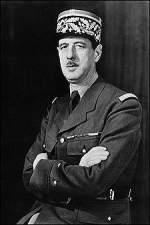
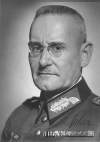
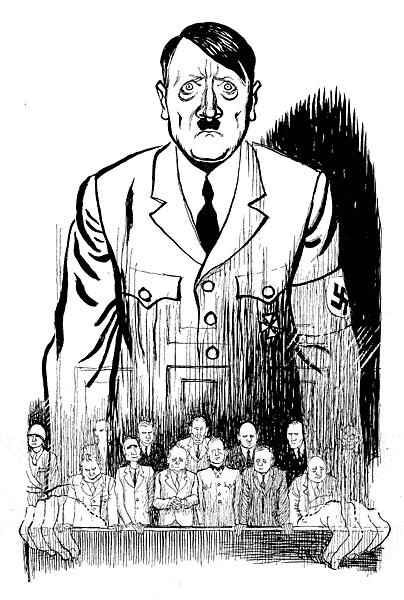
If it is the purpose of this Trial to obtain the most faithful picture possible of events and connections, it is not fair to start out by discrediting any mention of those who are dead, and who—as the Prosecution also know—are the major culprits. This is especially true of the Defendant Keitel, whose position, influence, and actions cannot possibly be judged correctly without throwing light upon the person of Adolf Hitler and upon his relationship with Keitel.
As can already be seen from Mr. Justice Jackson's opening statement, we are dealing here with an indictment against the National Socialist system. Actually, the Indictment is a global indictment against this system, split up into 21 individual indictments. The individual defendants are, to a certain extent, mere symbolic figures of the spheres of authority of the State which was ruled by this system: namely, Party, Government, and Armed Forces. If I understand Mr. Justice Jackson correctly, he goes even further in saying: "Above all personal forces are nameless. And impersonal forces; their conflict with each other makes up much of humanity's history . . . . What are the real forces which are battling here in front of you?" This statement raises a problem which, Gentlemen of the Tribunal, cannot be left unmentioned at this Trial, a problem which M. de Menthon also pointed out: The importance and influence of those forces which shape fate.

levi.bookin@gmail.com










Fair Use Notice: This site may contain copyrighted material the use of which has not always been specifically authorized by the copyright owner. We are making such material available in our efforts to advance understanding of historical, political, human rights, economic, democracy, scientific, environmental, and social justice issues, etc. We believe this constitutes a "fair use" of any such copyrighted material as provided for in section 107 of the US Copyright Law. In accordance with Title 17 U.S.C. Section 107, the material on this site is distributed without profit to those who have expressed a prior interest in receiving the included information for research and educational purposes. If you wish to use copyrighted material from this site for purposes of your own that go beyond 'fair use', you must obtain permission from the copyright owner.
Please Note: The list-owner and moderators of 3rdReichStudies are not responsible for, and do not necessarily approve of, the random ads placed on our pages by our web server. They are, unfortunately, the price one pays for a 'free' website.



